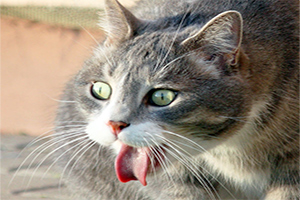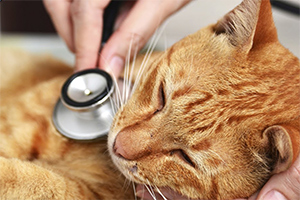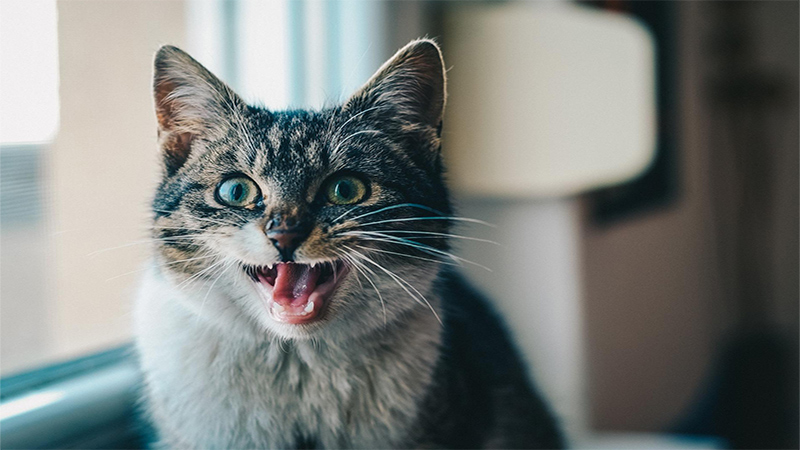In some circumstances, a cat may begin to exhibit signs of distress by opening its mouth, gagging, and not feeling comfortable. Every circumstance is different, but the cat's mouth will almost always play a role. Even a cat acting like something is stuck in its mouth will make you wonder why. When cats have asthma, dental issues, allergies, or an infection, they may feel something is stuck in their mouth. A cat may occasionally also be experiencing a hairball.
Related Topics You Might Like:
Reasons why it seems that something is stuck in the cat's mouth.

Hairballs
Your cat may occasionally experience hairballs due to her meticulous grooming habit. She is more likely to experience hairballs if she has long hair. When a cat ingests much loose hair while grooming, it results in a cigar-shaped wad of fur known as a hairball. The majority of cats commonly experience hairballs.
And as long as the mass is passed through pooping or expelled by vomiting, this shouldn't be life-threatening. Cats typically pass hairballs once or twice per month. You will see your cat gagging or retching during these episodes as she tries to vomit the ingested hair. She should be able to get rid of the hairball after a few tries.
If this hairball gets stuck in your cat's throat, it could cause problems. It could then become life-threatening and block her airways. Gastrointestinal obstruction is also possible if the wad is not eliminated through the stool. In either scenario, you must visit your veterinarian right away.

Asthma
A cat may occasionally develop breathing problems as a result of asthma. Cats can manage the symptoms of asthma, just like humans. It can include having a suffocating sensation and having trouble breathing fully. The cat will start to gasp for air when this occurs. It is a typical response to their current physical situation.
You should immediately seek veterinary care from a professional if you want to assist a cat who has asthma. They will spend the necessary time determining what must be done to clear the airways. You should eventually install air filters inside the house. This will guarantee that the cat won't be bothered by the dander or anything else in the living area. You must make these changes if you want to prevent future asthma attacks.
Small particles lodged in the throat.
Cats occasionally may unintentionally consume strange objects out of curiosity. In their explorations, they can eat toilet paper, insects, or even a piece of string that catches their attention. Unfortunately, some of these foreign objects may end up in your cat's mouth and become lodged there, making her cough or wheeze in an attempt to expel them. If she eats kibbles and some of the pieces get stuck in her teeth, that situation is also comparable. It frequently occurs when a cat eats too quickly or the kibble is the wrong size for her.
She might need your assistance if she's having trouble getting the stuck object out of her mouth. However, any indication that she might be choking or have a blockage in her throat constitutes an emergency, so you must take her to the closest animal hospital immediately.
Symptoms of heart problems
Cats who have heart issues, such as congestive heart failure, may experience persistent coughing and shortness of breath. Congenital heart defects and high blood pressure are two possible causes of feline congestive heart failure, among other things. Heart disease over time can also lead to fluid buildup in the lungs, making it more difficult for your cat to breathe and shortening her life.

In addition to coughing, other heart-related symptoms can include open-mouthed panting, trouble falling asleep, loss of appetite, and unexpected collapse.
To remove the extra fluid from your cat's lungs, your veterinarian will frequently administer oxygen therapy in addition to injectable diuretics. He will give her medication to treat her congestive heart failure and make her pet's breathing easier once the condition has been identified.
Parasites in the respiratory tract
Wherever they reside on the body, parasites are a pain, and some of them can get into your cat's mouth, making her unhappy as she tries to get rid of them. In the worst scenarios, the parasites might move to her respiratory system and cause fatal complications. If you think your pet may have respiratory parasites, there are a few signs you should look out for. There may be persistent coughing and wheezing, difficulty breathing, and a generally sickly appearance. As a preventative measure, it is essential to have your pet regularly checked for worms and other parasites. In the event of an infection, your veterinarian can recommend medications to get rid of them.
Allergies
Cat allergies can result in various symptoms, such as breathing through the mouth as if something were stuck. If your cat has a heightened sensitivity to environmental irritants, her immune system will overreact by producing antibodies that swell and inflame the sinuses, nose, and throat. She finds it difficult to breathe due to this reaction, opening her mouth to take in as much oxygen as she can.

